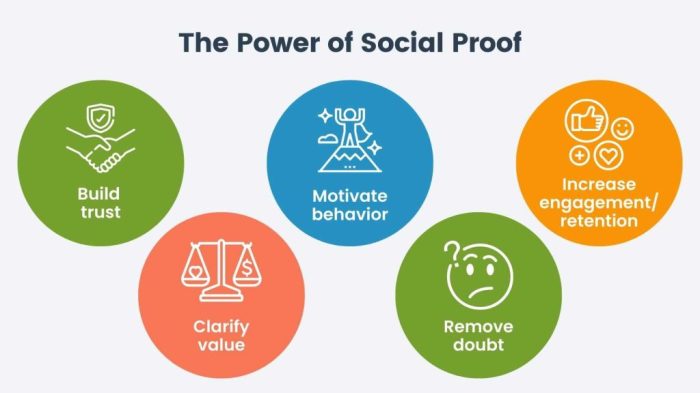With Social Proof Strategies at the forefront, this paragraph opens a window to an amazing start and intrigue, inviting readers to embark on a storytelling American high school hip style filled with unexpected twists and insights.
Are you ready to dive into the world of social proof and discover how it can revolutionize your marketing game?
Introduction to Social Proof Strategies
Social proof in marketing is the psychological phenomenon where people assume the actions of others in an attempt to reflect correct behavior for a given situation. It is a powerful tool used by marketers to influence consumer behavior by showcasing the positive experiences and actions of others. Social proof strategies involve leveraging this concept to build trust, credibility, and influence potential customers.
Examples of Social Proof Impacting Consumer Behavior
- Customer Reviews: When potential buyers see positive reviews from satisfied customers, they are more likely to trust the product or service and make a purchase.
- Celebrity Endorsements: Seeing a celebrity or influencer using a product can create a desire for consumers to have the same item, based on the assumption that it must be good if a famous person is using it.
- Social Media Likes and Shares: High engagement on social media posts can signal to consumers that a product is popular and worth trying.
- Testimonials: Personal stories and testimonials from real people can create a connection with potential customers and convince them to buy based on the positive experiences shared.
Types of Social Proof Strategies
Social proof strategies are essential for building credibility and trust with potential customers. Different types of social proof can be utilized to showcase the positive experiences of others and influence purchasing decisions.
Testimonials
- Testimonials are statements or reviews from satisfied customers who have used a product or service.
- They can be in written or video format and are effective in showing real-life experiences and success stories.
Case Studies
- Case studies provide in-depth analysis of how a product or service helped a specific customer solve a problem or achieve a goal.
- They offer detailed insights into the benefits and outcomes of using the product/service.
Influencer Endorsements
- Influencer endorsements involve popular personalities promoting a product or service to their followers.
- These endorsements can reach a wide audience and create a sense of trust and credibility.
Each type of social proof strategy has its own strengths and effectiveness in influencing consumer behavior. Testimonials provide direct feedback from customers, case studies offer detailed insights, and influencer endorsements leverage the influence of popular figures.
Companies like Apple, for example, effectively use testimonials from satisfied customers to showcase the quality and performance of their products. HubSpot utilizes case studies to demonstrate how their marketing software has helped businesses achieve success. Fashion brands like Nike often partner with influencers to promote their products to a larger audience.
Implementing Social Proof Strategies

To effectively implement social proof strategies, businesses need to focus on collecting social proof, incorporating it into their marketing campaigns, and leveraging it effectively to build trust and credibility with their audience.
Collecting Social Proof
One way businesses can collect social proof is by encouraging customers to leave reviews and ratings on their products or services. This can be done through follow-up emails, feedback forms, or review requests on their website. User-generated content, such as testimonials, case studies, and social media posts, can also serve as valuable social proof.
Incorporating Social Proof into Marketing Campaigns
– Feature customer testimonials prominently on your website and in marketing materials.
– Showcase positive reviews and ratings on product pages to influence purchase decisions.
– Utilize social media influencers or brand ambassadors to endorse your products or services.
– Create user-generated content campaigns to encourage customers to share their experiences with your brand.
– Use social proof in email marketing campaigns to increase engagement and conversions.
Best Practices for Leveraging Social Proof
– Ensure that the social proof is authentic and genuine to build trust with your audience.
– Use a variety of social proof types, such as expert opinions, celebrity endorsements, and user reviews, to appeal to different segments of your target audience.
– Incorporate social proof throughout the customer journey, from awareness to purchase and beyond.
– Monitor and track the performance of your social proof strategies to optimize and improve over time.
– Continuously update and refresh your social proof to keep it relevant and impactful.
Measuring the Impact of Social Proof: Social Proof Strategies

In the world of social proof strategies, it’s essential to measure the impact of your efforts to ensure they are effective in influencing conversions and building trust with your audience.
Key metrics to measure the effectiveness of social proof strategies include:
Conversion Rate, Social Proof Strategies
- Conversion rate: Measure the percentage of website visitors who take a desired action, such as making a purchase, after being exposed to social proof.
- Unique Visits: Track the number of unique visitors who interact with social proof elements on your website.
Tools and methods to track and analyze the impact of social proof on conversions:
Analytics Tools
- Google Analytics: Utilize Google Analytics to track and analyze the behavior of visitors interacting with social proof elements on your website.
- A/B Testing: Conduct A/B testing to compare the performance of pages with and without social proof to determine its impact on conversions.
Examples of businesses that have successfully measured the ROI of their social proof strategies:
Business Success Stories
- Amazon: Amazon utilizes customer reviews and ratings to showcase social proof, leading to increased conversions and sales. They track the impact of reviews on product pages to measure the ROI of their social proof strategy.
- Social media influencers: Brands partnering with social media influencers track metrics such as engagement rates, click-through rates, and conversions to measure the effectiveness of influencer social proof campaigns.





